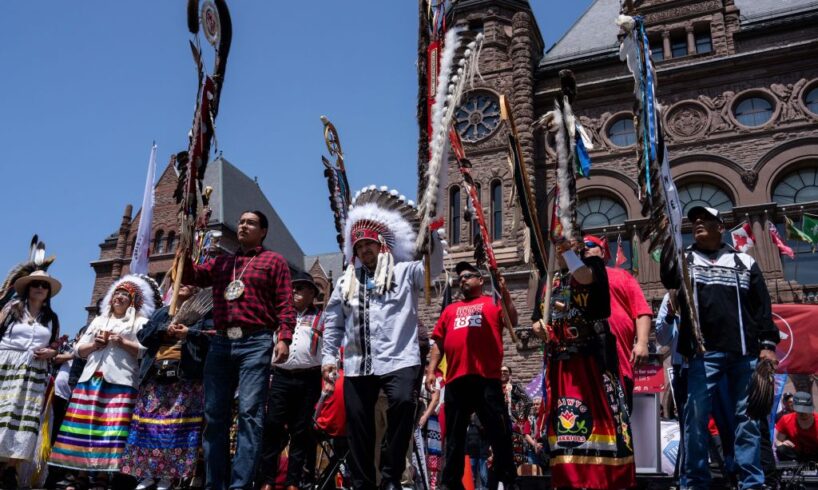
Ontario didn’t consult Indigenous communities before passing Bill 5, which allows for “special economic zones” where “designated projects” can be fast-tracked. Now, leaked documents show how the Doug Ford government plans to fulfill its duty to consult on specific projects — plans one First Nation chief called “extremely vague,” in which consultation comes after projects have already been greenlit.
The plans are in what’s known as technical briefings, which are private presentations given by government bureaucrats to stakeholders. The Narwhal obtained copies of two briefings officials shared at recent meetings with First Nations about Bill 5, or the Protect Ontario by Unleashing Our Economy Act, 2025.
One of the leaked briefings proposes criteria for how the special economic zones would be determined. The other deals with exemptions from archaeological assessments, which are required by law before construction. Both also outline broad, preliminary steps as to how Indigenous consultations should be carried out, and pose questions about how to improve this process.
The briefings are being shared privately in consultations happening just weeks before the Doug Ford government is expected to release regulations for special economic zones. The new law allows for areas to be established where “trusted proponents” and “designated projects” are exempt from provincial and municipal environmental assessments and other rules. Early on, the province signalled its intention to designate the mineral-rich Ring of Fire in northern Ontario as one such zone, but after significant pushback, said on May 28 it would only do so after consulting First Nations.
Ontario Regional Chief Abram Benedict speaks during a rally opposing Ontario’s Bill 5 at Queen’s Park in Toronto on June 2, 2025. Photo: Sid Naidu / The Narwhal
Bill 5 was written without the government holding a single consultation with Indigenous communities, including many that would be significantly impacted by an increase in unchecked mining and development activity — communities that have historically not reaped the financial or social rewards of such industry.
The legislation quickly passed on June 4 and, as first reported by Northern Ontario Business, the government’s conversations with members of some First Nations about the special economic zones and archaeological assessments started at the end of July. They have taken place already in Toronto, London and Thunder Bay, and are set to continue with another Toronto meeting on Aug. 12 and one in Sudbury on Aug. 14.
“This is all disingenuous,” Chief Russell Wesley of Cat Lake First Nation told The Narwhal. He attended an early August information session in Thunder Bay, along with members of three other First Nations. He also attended the earlier session in Toronto, and said it was attended by 12 people, five of whom were Indigenous.
Invitations to sign up for these closed-door sessions were sent on “a compressed timeline,” Wesley said; the government sent them out on July 22 with a deadline of July 28. The location and time for each meeting are sent less than 24 hours in advance, he said. Many First Nations didn’t receive an invitation. And several Indigenous communities that would be most impacted by Bill 5 are coping with massive wildfires and remain under evacuation orders.
“I’m not surprised by anything. [Governments] have always followed this pattern of addressing and prioritizing their needs,” he said. “Their consultation process is time-sensitive. Ours is not.”
Several constitutional and Indigenous lawyers reviewed the briefings upon The Narwhal’s request. Like Wesley, they expressed concern about a lack of detail in the proposals and a lack of restrictions on Cabinet’s ability to create special economic zones wherever it wants in the province.
Lawyers also noted a lack of detail about how the government plans to fulfill its duty to consult. That duty is a requirement stemming from Section 35 of the Constitution Act, 1982, and linked to the principle of the “honour of the Crown,” which means the government must act honourably and in good faith in all its relationships with Indigenous nations.
In one briefing, the government’s proposed criteria for the duty to consult is that it be met “per proposed project”; there is little detail about what consultation would require, how consent would be evaluated or concerns addressed.
For Wesley, the vague commitments and rushed meetings fell short of respecting Aboriginal and Treaty Rights. “They cannot simply legislate away these rights,” he said. “The absence of consultation before Bill 5 is a direct violation of this duty.”
“What they have to say is predetermined,” Wesley added. “How can you meaningfully consult in an hour and a half? That’s crazy. The government must reflect on its actions and honour its duty to consult properly.”
The Narwhal sent a list of questions to Premier Ford’s office, as well as the ministries of Energy, Indigenous Affairs and the Attorney General, asking about the government’s plan for meeting the duty to consult.
The Narwhal also asked whether the government had changed its proposals since the briefings were written, whether it was planning on doing so before the regulations were officially released, whether it could list the First Nations it has shared the presentation with and whether it could summarize their feedback. The ministries did not return the requests for comment before publication.
With legal challenges already underway, Bill 5 draft regulations are ‘daring’ First Nations to take Ontario to court
In its briefing, the government notes special economic zones are “meant to be used only for a narrow set of circumstances when it is of the utmost importance to Ontario’s economy and/or security.” The plan as outlined, however, fails to meet this goal, lawyers and First Nations representatives told The Narwhal.
The government proposes three sets of criteria for how to figure out where a special economic zone will go, what projects would be inside it and which business, municipalities or ministries would carry the projects out.
Ontario Minister of Indigenous Affairs and First Nations Economic Reconciliation and Minister Responsible for Ring of Fire Economic and Community Partnerships Greg Rickford speaks to reporters alongside Minister of Energy and Mines Stephen Lecce on May 26, 2025. The province has signalled its intention to fast-track mining projects in northern Ontario’s Ring of Fire region, but after significant pushback, said on May 28 it would only do so after consulting First Nations. Photo: Sid Naidu / The Narwhal
For example, the government said zones should contain “significant economic activities,” while proponents should have a “reputable compliance record” and projects should have a “high likelihood of success.”
The briefing also notes that each zone will offer “specific benefits to Indigenous peoples and communities in Ontario,” without specifying what those benefits might be.
“The criteria leave the discretion [of creating a special economic zone] substantially unfettered,” Phil Pothen, a lawyer with the Canadian advocacy organization Environmental Defence, said. “It’s entirely subjective and extremely vague.”
Pothen was also skeptical of the government’s proposal that a “supporting ministry” would make a “commitment” to stickhandle all the Crown’s consultation obligations. It doesn’t specify which ministries might be chosen — Energy and Mines, Economic Development and Indigenous Affairs and Economic Reconciliation are obvious potentials, but the province has 30 in total — or lay out how the choice would be made or how that commitment is guaranteed to translate into action.
This supporting ministry would “coordinate Ontario’s duty to consult obligations as applicable, that may arise following the proposed designation, development and implementation of the project.”
“They are not actually committing to any process,” Pothen added. “They’re limiting duty to consult to a stage at which duty to consult cannot be complied with, at the project level, when you just know the general project details. You don’t know how it will impact First Nations, how it will impact their water supply, lands, cultural sites.”
And with the sweeping approvals a special economic zone grants, Pothen said any consultation that is done will lack the critical environmental and heritage details that the various studies and permits in the regular approval process are designed to identify.
“They’re daring First Nations to challenge them on a case-by-case basis,” he said.
Robert Janes, a partner at JFK Law LLP, said the government’s approach seems to “muddle together” two different processes: one where projects are approved, and another where special economic zones are designated.
This muddling, he said, will lead to confusion over which ministries are responsible for what, and what permits or other approvals actually apply in each circumstance.
“This is the sort of situation that often leads decision-makers to fall short on the duty to consult, because they assume that Indigenous issues will be dealt with by someone else,” Janes said in emailed comments to The Narwhal.
Janes said the Supreme Court of Canada has made it clear “over and over again” that, once legislation is passed, the duty to consult applies to all stages of Crown decision-making. The government needs to “clearly identify someone as being truly responsible” to ensure consultations are properly carried out, he said.
“This is going to send a strong negative message to First Nations that their concerns are not really being addressed and that they cannot really expect to affect the government’s intention to proceed,” Janes said.
“This undermines reconciliation and is also very much the type of situation where the courts end up intervening to get things on track.”
The peatlands in Ontario’s Far North store about 35 billion tonnes of carbon. In the Ring of Fire region, the Ontario government is pushing to fast-track projects that would mine the area for critical minerals. Photo: Casa di Media / The Narwhal
Legal challenges have already begun. On July 15, nine First Nations in Ontario filed an injunction to repeal Bill 5, along with parts of the federal Bill C-5, deeming both unconstitutional.
“While the laws do leave open or commit that there will be some First Nation consultation at the very first stage … involvement in that decision alone is a smoke and mirrors trick, deflecting attention from all the other ways the laws necessarily diminish the ability of First Nations to engage on the regimes’ broader consequences,” they wrote in the court challenge.
On Aug. 7, Marten Falls First Nation, which has been working with the Ontario government on plans for road access to the Ring of Fire, filed an injunction to stop any mining activity in the region spurred by Bill 5. Chief Bruce Achneepineskum told reporters his community was not consulted prior to the bill’s passage and his nation was “not willing to be stepped on or stepped over.”
‘It’s not a policy decision or a choice’: Ontario government still mulling how to meaningfully consult First Nations on laws enacted through Bill 5
The two technical briefings include questions about what criteria the province should consider in carrying out Indigenous consultations for its special economic zones.
“In designating a project, consultation with the Indigenous communities potentially impacted by the project is important. How should this consultation be reflected in criteria?” one document asks.
Later on it poses the questions, “Are any criteria missing? Should any be added, removed or modified?”
In the document proposing exemptions for archaeological assessments, the government suggests the process for “considering and granting” exemptions should involve an “opportunity for meaningful consultation with Indigenous communities.”
It says that when a ministry is working on one of these exemptions, a “report or plan” should be required that would show what, if any, consultations had already taken place, as well as any “future consultation plans.”
It also asks how the government should ensure these reports demonstrate a real plan to meet duty to consult obligations.
“Overall, Ontario’s proposals and their characterization of the duty to consult as their ‘commitment’ to First Nations fall short of the constitutional obligations that the province has,” Justin Thompson, a lawyer with Olthuis Kleer Townshend LLP and a member of Nipissing First Nation who attended one of the sessions, told The Narwhal in an email. “It’s not a policy decision or a choice — Ontario must take steps to address potential impacts on First Nations and their rights.”
“Engaging in consultation after a designation, development or implementation of a project fails to capture the purpose of the duty and does not respect the nation-to-nation relationship between First Nations and the Crown,” Thompson added. “As a government, Ontario needs to do better.”
Chief Wesley echoed the point. “Consultation must occur before decisions are made, not after to justify a predetermined outcome,” he said. “The government is just prioritizing its economic agenda over its legal obligation.”
“This is a recurring comment by so many First Nations: we’re not against development but you have to include us in these things. You have to talk to us,” he added. “But they just expect us to show up.”





